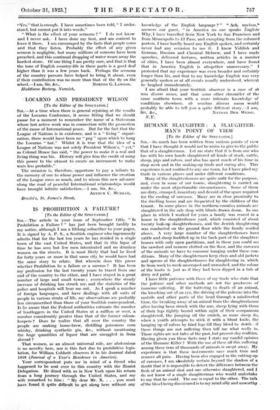IS PROHIBITION A FAILURE?
[To the Editor of the SPECTATOR.] SIR,—The article in your issue of September 12th, " Is Prohibition a Failure ? " has just been brought tardily to my notice, although I am a lifelong subscriber to your paper. It is signed by A. P. S., a Scottish engineer who ingenuously admits that for the last ten years he has resided in a single town of the vast United States, and that in this lapse of time he has seen but few men intoxicated and no drunken women on the streets. It is most likely that had he lived for forty years or more in that same city he would have had the same story to relate. But wherein does this prove whether Prohibition be a failure or a success ? It has been my profession for the last twenty years to travel from one end of the country to the other, and I have stayed in a great number of large and small towns ; everywhere the steady increase of drinking has struck me, and the statistics of the police and hospitals will bear me out. As I speak a number of foreign languages, and have dealings with all sorts of people in various strata of life, my observations are probably less circumscribed than those of your Scottish correspondent. Is he aware•that the Federal authorities estimate the number of bootleggers in the United States at a million or over, a number considerably greater than that of the former saloon- keepers ? Does he realize that all over the country the people are making home-brew, distilling poisonous corn whisky, drinking synthetic gin, &c., without mentioning the huge quantities of liquor that are smuggled in from abroad ?
That women, as an almost universal rule, are abstemious is no novelty here, nor is this fact due to prohibitive legis- lation, for William Cobbett observes it in his Journal dated 1818 (Journal of a Year's Residence in America).
Your correspondent puts me in mind of a friend who happened to be sent over to this country with the Zionist Delegation. He dined with us in New York upon his return from a long journey through the United States, and my wife remarked to him : " My dear Mr. X. . . . you must have found it quite difficult to get along here without any knowledge of the English language ? " " Ach, madam," answers our guest, " in America no one speaks Prigliste Why, I have travelled from New York to San Francisco and from Minneapolis to El Paso, and excepting from the coloured porters, I have hardly heard any English spoken, and certainly never had any occasion to use it. I know Yiddish and German, Russian and Classical Hebrew, and I have made speeches, delivered lectures, written articles in a number of cities, I have been almost everywhere, and have found that in America English is altogether unnecessary." I protested that my experience was even broader and certainly longer than his, and that to my knowledge English was very generally spoken or at all events usually understood, whereat he laughed immoderately.
I am afraid that your Scottish observer is a case of ab una discere onnes, and that some other chronicler of the same southern town with a more intimate knowledge of conditions elsewhere, ab onnibus discens unam -would probably be able to tell you a quite different story.—I am, N.Y.






























































 Previous page
Previous page